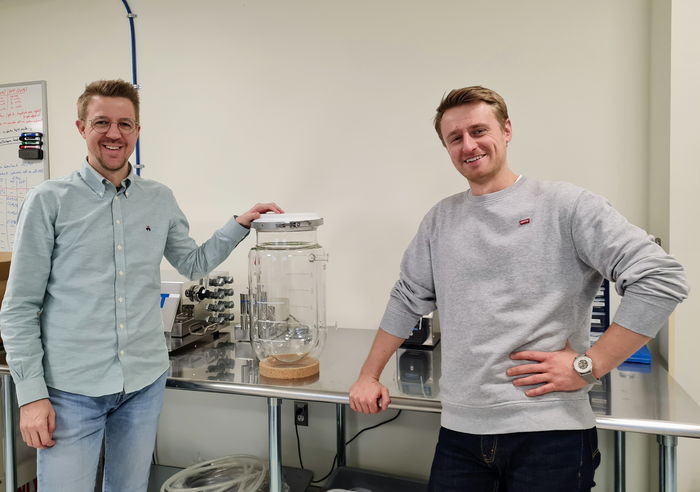Lutz Grossmann is on a scientific quest to develop tasty, animal-free protein that has a minimal carbon footprint and is generated without the use of agricultural land, which is a common and more stressed source of the world’s food supply.

Lutz Grossmann (left) and his PhD student Carlos Woern with one of the vessels that will be used for the cultivation process. Image Credit: UMass Amherst
The increasing global population and a changing climate increase the pressure on our food and protein supply coming from these natural habitats. By 2050, we need to produce up to 60% more food, but we don’t want to transform more land into agricultural land. This is the reason why alternative sustainable protein supply chains are urgently needed to ensure future food security.”
Lutz Grossmann, Assistant Professor, Food Science, University of Massachusetts Amherst
Grossmann has been granted a $430,485 New Innovator Grant from the Foundation for Food & Agriculture Research to help him get started on his long-term aim as an early-career researcher. “We want to prove that humanity is exceptionally resilient when it comes to food production,” he says.
Grossmann is one of 10 scientists to get the latest round of New Innovator Grants.
“…FFAR is proud to support these early career scientists as they pursue the creative research that will overcome current and future challenges to our agricultural and food systems,” FFAR Executive Director Saharah Moon Chapotin said in announcing the grant recipients on April 24th, 2023.
Grossmann Lab’s main goal is to create protein-rich foods driven by hydrogen from bacteria. “We found this interesting technique where you can use gasses to grow bacteria rich in proteins you can later consume,” he details.
Grossmann intends to use renewable “green electricity”—solar, hydropower, or wind—to split water into hydrogen and oxygen via electrolysis, and then use the hydrogen as an energy source for hydrogenotrophic bacteria.
The cultivation of these bacteria requires no inputs coming from traditional agriculture. In fact, the bacteria can be grown by bubbling hydrogen, CO2, and O2 in a reactor filled with water that is enriched with nitrogen and minerals.”
Lutz Grossmann, Assistant Professor, Food Science, University of Massachusetts Amherst
NASA investigated the use of hydrogenotrophic microorganisms to feed astronauts on space missions in the 1960s. The concept has reappeared in recent years in light of the need for alternative and sustainable global food sources.
Grossmann's previous study focused on growing different single-cell proteins derived from microalgae with sunlight, carbon dioxide, and fertilizer. “Microalgae is still a very interesting biomass, but they need a lot of sunlight and for this you need a lot of surface area, so there are some limitations.”
Once Grossmann and his group grow the bacteria, they will concentrate on the resulting protein-rich byproducts—a sort of cell slurry.
We have to figure out how to extract the protein and optimize the process to preserve the functionality of the proteins. Then we need to understand what kind of foods we can form.”
Lutz Grossmann, Assistant Professor, Food Science, University of Massachusetts Amherst
He will receive a lot of support for this. Many UMass food scientists specialize in the complex, multidisciplinary realms of structural design, nanotechnology, protein functioning, bioavailability, and metabolism.
“We have to be able to design foods that are nutritious and tasty. In the end, we want to feed people,” Grossmann concludes.